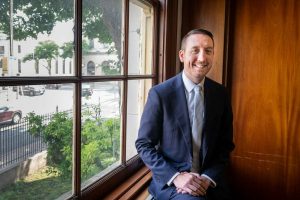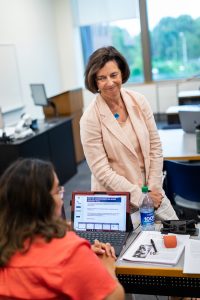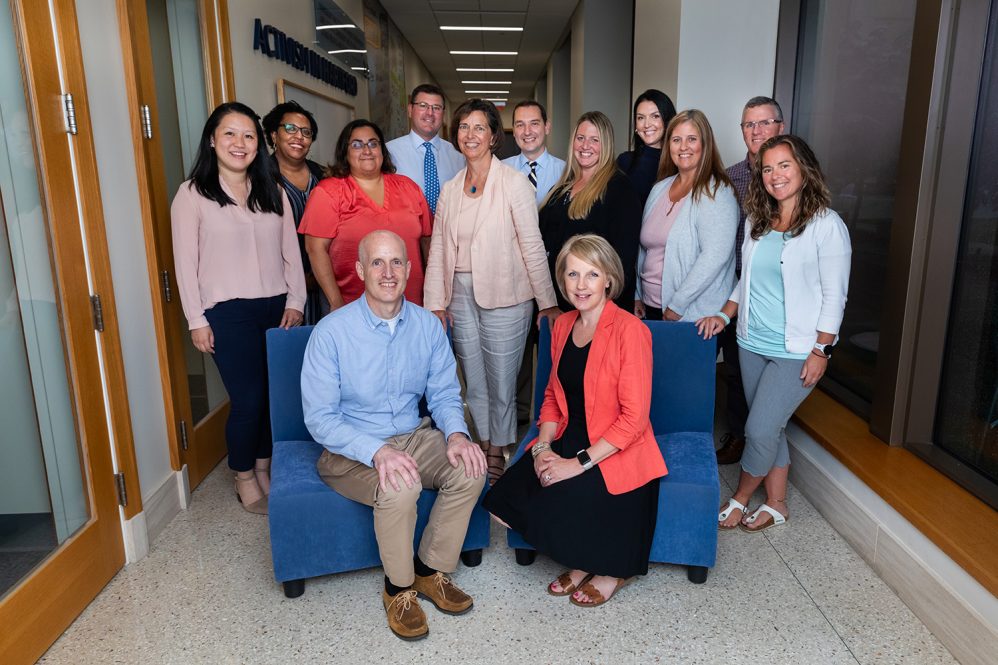Across Connecticut, a growing number of school districts are being shaped by graduates of the University of Connecticut’s Executive Leadership Program (ELP) — leaders who are redefining what it means to serve with purpose, vision, and equity.
This year, numerous ELP alumni from various cohorts were newly hired, stepping into superintendent and central office roles that allow them to drive initiatives that improve teaching, strengthen communities, and expand educational opportunities for every student. They include Darren Schwartz ’09 6th Year, ’21 ELP; Jeff Wihbey ’95 (CLAS), ’06 6th Year, ’13 ELP; Dave Caruso ’06 6th Year, ’23 ELP; Scott Sugarman ’17 ELP; Iris White ’24 ELP; and Juan Mendoza ’19 ELP.
While the new appointments mark important milestones, they often come after years of preparation and persistence — a reality well understood by Kelly Lyman ’92 MA, ’93 6th Year, ’10 ELP, Executive Leadership Program coordinator and former superintendent of Mansfield Public Schools: “It often takes a few years to get their first position because the number of openings is rather small.”
For many graduates, that period of preparation is when ELP proves most valuable, equipping them with the confidence, vision, and skills needed to lead at the highest levels.

“The program gave me the confidence to lead boldly and make systemic change,” says Schwartz, who is the superintendent of Waterbury Public Schools. “I found tremendous value in the instruction and guidance provided by our faculty — especially the opportunity to learn from highly effective superintendents who served as guest speakers.”
For Wihbey, superintendent of Wethersfield Public Schools, who this year began his third superintendent role since graduating from ELP, the program’s systems-thinking approach reshaped how he sees his district.
“ELP helped me see school districts as a system of interacting parts,” he says. “Good leadership sees a district from 35,000 feet and understands the different perspectives and roles.”
Like Wihbey, many alumni describe a similar shift in mindset — one that reshapes how they approach decision-making, collaboration, and systemic change within their districts. These reflections capture a central truth about ELP: its impact goes far beyond earning a certification. It transforms how leaders think and act. That preparation is evident throughout Connecticut.
For Caruso, superintendent of Bolton Public Schools, the most transformative lessons came from the candid stories of sitting superintendents.
“Hearing how they navigated complex issues like budget, community engagement, and strategic planning broadened my understanding of effective leadership,” he says. “There is no single path to success — the program helped me define my own.”
That blend of shared wisdom and practical experience creates ripple effects across districts.
“I always pull my ELP resources to be a catalyst for my thought process,” says Sugarman, superintendent of Stafford Public Schools. “It’s also helpful to have a network of new and established superintendents to connect with and problem-solve.”
I always pull my ELP resources to be a catalyst for my thought process. It’s also helpful to have a network of new and established superintendents to connect with and problem-solve. — Scott Sugarman ’17 ELP
Many graduates describe the program as career-changing, one that deepened their understanding of systems leadership and expanded their sense of purpose.
“Coursework and real-world examples improved my abilities in strategic planning, stakeholder engagement, and data-informed decision-making,” says White, superintendent of Bristol Public Schools. “It made it easier to translate district goals into actionable priorities.”
“The professors, each a former superintendent, brought real-world knowledge that made every class meaningful,” says Mendoza, deputy superintendent of Waterbury Public Schools. “The program prepared me through hands-on experiences, including the internship, site visits, and journal reflections.”

“Certainly, my work in Mansfield as superintendent was possible due to the foundational understandings that I developed in ELP,” Lyman says. “I believe in the program; I can see the impact that it can have, not only in my own work, but in that of so many of my colleagues who are ELP alumni.”
Lyman says she’s continually inspired by the next generation of superintendents coming through the program.
“We’re preparing you to do the things that those of us who have left the work weren’t able to accomplish,” she says she often tells program participants.
Inside the Executive Leadership Program
The University of Connecticut’s Neag School of Education established the Executive Leadership Program in 2000 to prepare experienced administrators for the highest levels of school district leadership. The one-year, 15-credit, cohort-based program blends rigorous coursework with authentic, real-world learning experiences, providing the preparation needed to earn the Connecticut Superintendent’s Certificate (093) and the mindset to lead with vision and equity.
Through a partnership with the Connecticut Association of Public School Superintendents (CAPSS), participants engage in internships, site visits, and mentorships with sitting superintendents. This collaboration bridges the gap between theory and practice, offering a close-up look at the realities of district leadership.

“If you are interested in continuing to learn, growing your skills as a leader, and understanding the complexities of organizations, then this is a program for you,” Lyman says.
Participants come from a variety of backgrounds and districts, bringing a wealth of perspectives to the cohort experience. The result is a powerful professional network that continues long after graduation.
“The networking with colleagues across the state is powerful and creates a bond that lasts for years,” says Joseph Macary ’05 ELP, ’16 Ed.D., superintendent of Vernon Public Schools. “The internship is the best part of the program — you get to ‘see behind the curtain’ of how a district truly operates.”
Since 2000, ELP has developed hundreds of educational leaders who now serve as superintendents, assistant superintendents, and central office administrators throughout Connecticut and beyond. Together, they’re building stronger leadership pipelines, fostering inclusive decision-making, and leading districts where every student can thrive.
“We are preparing leaders to take on challenges that continue to evolve,” Lyman says. “Leaders who will make meaningful change in their districts and communities for years to come.”
To learn more about the Neag School of Education’s Executive Leadership Program, visit administration.education.uconn.edu/elp/about.



